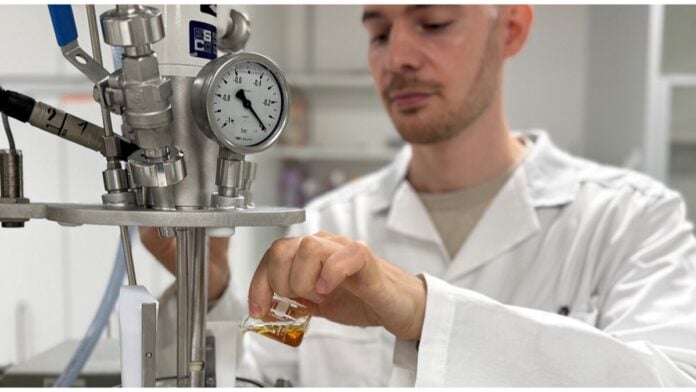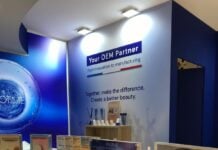Mibelle Group, LanzaTech and the Fraunhofer Institute IGB (interface and bioprocess engineering) have succeeded in obtaining a palm-oil-free fat from CO₂.
Because of oil palm's high yield, long shelf life and resistance to heat, the
Palm oil - an essential raw material for industry, thanks to the oil palm's high yield, long shelf life and resistance to heat - is harmful. Its cultivation leads to the deforestation of an ever-increasing proportion of tropical forests. This threatens many animal and plant species and releases large quantities of stored CO₂.
Aware of this situation, the cosmetics industry mainly sources palm oil from certified crops. This approach guarantees that the raw material comes from sustainably managed sources. However, this solution cannot meet the industry's growing demand in the long term. Hence the search for alternatives.
Mibelle Group, LanzaTech and the Fraunhofer Institute IGB have succeeded, using modern biotechnology from CO₂, in obtaining a palm-oil-free fat. This innovative technology enables palm oil to be sustainably replaced in all products in which it is present.
A new technology
The combination of two successive fermentation processes transforms the greenhouse gas CO₂ into a palm-oil-free fat blend. The composition of this blend is so similar to that of palm oil that it will be able to replace tropical oils in many applications in the future, according to Mibelle Group, LanzaTech and the Fraunhofer Institute IGB.
Initially, the gas that would have been released in the form of CO₂ is transformed into alcohol by biotechnology using the gas fermentation process developed by LanzaTech. This process is comparable to that used to make beer, with CO₂ used here as a raw material instead of grain.
In the second fermentation process, largely developed by Fraunhofer IGB, the alcohol produced from CO₂ is converted into the desired fats by specialized oil yeasts. Only natural, non-genetically modified microorganisms are used in both fermentation processes.
The end product is a high-quality, all-purpose grease, 100 % palm-oil-free and entirely natural. According to its developers, it also has excellent nourishing properties, an important feature for cosmetic products.
"This innovation is the fruit of our long-standing partnership with LanzaTech and represents a major milestone for the cosmetics industry. Combined with the innovative strength of Fraunhofer IGB, it enables us to set new standards for the entire sector, and underlines our commitment to taking responsibility for the future of our planet while making supply chains more robust."says Peter Müller, CEO of the Mibelle Group.
From prototype to market
Following successful laboratory trials at Fraunhofer IGB and promising application tests in Mibelle Group laboratories, the partners are now launching industrial-scale production of the palm-oil-like fat blend. To this end, the fermentation processes are gradually being transferred to a larger scale at the Fraunhofer Center for Chemical and Biotechnological Processes CBP in Leuna, a division of Fraunhofer IGB.
"After successful laboratory research, we were able to start developing the pilot process, enthuses Susanne Heldmaier, Head of Research and Technical Innovation at the Mibelle Group. This is an important step that will enable us to obtain the first quantities of a high-quality fat. This will enable us to develop cosmetics that not only protect our skin, but also help to protect the environment. In the future, with the support of our raw material suppliers, we hope to be able to convert more and more palm oil-based raw materials to this sustainable solution."
Five years ago, Mibelle Group had already launched a product recycled from CO₂, the CO₂ being able to be converted into ethanol thanks to the fermentation process developed with LanzaTech. A raw material used in large quantities to manufacture household cleaning products.








